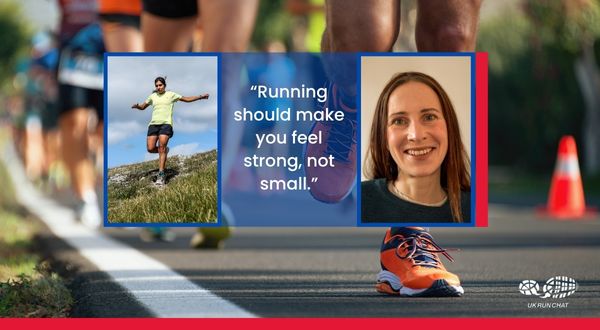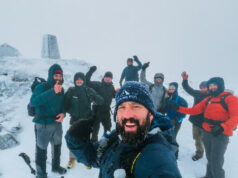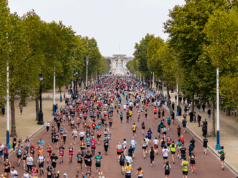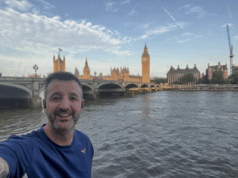Running can be medicine, or a mirror.
For many of us, running starts as a simple act of escape, a chance to clear the head, move the body, and find freedom. But for others, that same passion can become tangled in control, comparison, and perfectionism.
In two powerful UKRunChat podcast interviews, Francesca Baker-Brooker and Renee McGregor speak openly about the fine line between running for joy and running for worth.
Both women have lived and worked within the intersection of mental health, nutrition, and sport — Francesca as someone who rebuilt her relationship with running after anorexia, and Renée as a sports dietitian helping runners rediscover balance.
Their stories reveal a truth we all need to hear.
“Running should make you feel strong, not small.”
Francesca’s story: from punishment to pride
Francesca’s relationship with running hasn’t always been healthy. In her twenties, she developed anorexia, a period where food, exercise, and self-worth became deeply intertwined.
“Running was punishment,” she admits. “It wasn’t about joy or freedom. It was about control.”
Years of therapy, recovery, and self-work slowly changed that. But it wasn’t until she began reconnecting with running on her own terms that she realised how powerful it could be when used positively.
Now in her late 30s, Francesca runs for entirely different reasons.
“At 38, I finally ran in shorts,” she says.
“I used to hide my body for so long. Now I’m proud of it. I’m proud that it’s strong enough to run.”
That single moment symbolises years of recovery, and resonates with countless runners who’ve struggled to feel comfortable in their own skin.
The wider issue: when fitness culture fuels insecurity
Francesca’s experience isn’t rare. The modern fitness world often sells an illusion, that to be a ‘real’ runner, you must be lean and light.
Renee McGregor sees this daily in her clinic. A sports dietitian, she works with endurance athletes at every level, from amateurs to Olympians, many of whom unknowingly fall into cycles of under-fuelling and self-criticism.
“There’s so much noise online,” Renee explains. “People giving advice without qualifications, promoting diets or training plans that don’t fit everyone. It creates confusion and shame rather than confidence.”
She’s clear that discipline isn’t the same as restriction. Running should enhance life, not shrink it.
Why light = fast is a dangerous myth
In endurance sport, the phrase “lighter is faster” has long been romanticised. But Renee warns that the cost of chasing low weight often outweighs any short-term gains.
“Your body and your weight have very little to do with how good a runner you are,” she says.
“When you cut back on nutrition while training, you don’t get fitter — you get fatigued.”
This mismatch between perception and physiology is central to a condition Renee frequently treats: RED-S (Relative Energy Deficiency in Sport), a syndrome that occurs when the body doesn’t get enough fuel to support both training and basic health.
Symptoms can include:
- Constant fatigue
- Recurring injuries
- Missed menstrual cycles
- Low mood and poor recovery
Left unchecked, RED-S can cause osteoporosis, hormonal disruption, and mental burnout, consequences Francesca knows all too well from her own recovery.
Running for joy, not punishment
Francesca’s turning point came when she began running purely because it made her feel good.
“I stopped seeing running as something I had to do, and started seeing it as something I get to do,” she said.
She began exploring local trails, running with friends, and rediscovering her body’s strength instead of its size.
Renee echoes this message with her own evolution as a runner. Once driven by performance goals, she now runs in the Lake District for community and connection.
“Running is freedom,” she says. “It’s how I feel most myself, not for achievement, but for adventure.”
This shift – from outcome to experience – is something every runner can embrace. When running becomes a tool for wellbeing rather than validation, everything changes.
How to heal your relationship with running
1.Feed your body, not just your miles.
Eating enough isn’t optional. Fuel supports adaptation — the process where training translates into strength. As Renee explains: “You don’t just need energy to run. You need energy to progress.”
2. Rest days are training days too
Recovery is where growth happens. Sleep, rest, and social time aren’t gaps in training: they’re part of it.
3. Detach from data
Watches, calories, and step counts can motivate, but they can also control. If you find yourself anxious when you miss a target, take a break from the metrics.
4. Find your tribe
Both Francesca and Renee found healing through connection with friends, running clubs, and the broader community. At UKRunChat, our community thrives on that same inclusivity and support. Running is better shared.
5. Build a life worth being well for
Francesca credits a powerful piece of advice from her occupational therapist: “Recovery isn’t about being perfect. It’s about building a life worth being well for.”
That mindset shift applies to running too, it’s not about being the fastest or leanest, but about creating a lifestyle that supports joy, balance, and health.
A healthier future for runners
Running culture is changing. Conversations like these, between people brave enough to be honest, are helping to redefine what success looks like.
Francesca’s and Renee’s stories show that strength isn’t measured in splits or scales. It’s measured in how kindly you treat your body, and how consistently you keep showing up.
“I run because I love the feeling,” Renee says. “Not to achieve anything, but to connect with the world, with others, and with myself.”
That’s the kind of running we should all aspire to.
Listen to the full interviews:
Francesca Baker-Brooker on Running, Recovery & Rediscovering Joy
Renee McGregor on Fuel for Thought & The Myths of Performance Nutrition
And for practical advice on fuelling your training safely, read our companion article:
Running on empty: Why restricting calories doesn’t work.





